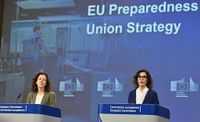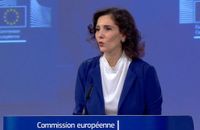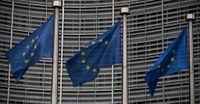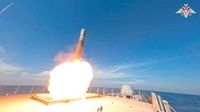On March 26, 2025, the European Commission unveiled its "Preparedness Union" strategy in Brussels, aimed at enhancing Europe’s capacity to tackle emerging threats. This initiative comes in response to increasingly complex crises that the European Union (EU) faces, including geopolitical tensions, cyber threats, and climate change. The strategy is designed to ensure that the EU is ready to protect its citizens and maintain essential societal functions crucial for democracy and daily life.
Commissioners Roxana Mînzatu and Hadja Lahbib presented the strategy at a press conference held at the Berlaymont Building, the Commission's headquarters. Mînzatu emphasized the need for a paradigm shift in how the EU approaches security, stating, "Fix your roof while the sun is still shining." This sentiment reflects the urgency for the EU to adopt a proactive stance towards preparedness.
The "Preparedness Union" strategy outlines 30 key actions aimed at fostering a culture of preparedness across all EU policies. Lahbib noted, "Preparedness must be woven into the fabric of our societies — everyone has a role to play." The strategy underscores that today’s threats are fast, complex, and interconnected, necessitating a more integrated and coordinated response at the European level.
One of the primary recommendations of the strategy is for EU households to assemble a three-day survival kit containing essential supplies. This kit should include items such as bottled water, non-perishable food, flashlights, batteries, and important documents secured in waterproof pouches. The Commission encourages citizens to be self-sufficient for at least 72 hours in the event of emergencies, including natural disasters, cyber attacks, or geopolitical crises.
European Commission President Ursula von der Leyen highlighted the importance of preparedness in her statement, saying, "Families living in flood zones should know what to do when the waters rise. Early warning systems can prevent regions hit by wildfires from losing precious time." This proactive approach aims to empower citizens to respond effectively to crises.
Lahbib further elaborated on the importance of preparedness, stating, "Knowing what to do in case of danger, gaming out different scenarios, that’s also a way to prevent people from panicking." This perspective is particularly relevant given the challenges posed by the COVID-19 pandemic and the ongoing conflict in Ukraine.
In light of these threats, the EU is also looking to enhance stockpiling of critical equipment and resources. The strategy calls for a strategic reserve of essential supplies to ensure that the EU can respond effectively to crises. Lahbib explained, "The EU will work with Member States to make sure people have essential supplies for 72 hours in a crisis." This initiative aims to create a secure and resilient EU capable of withstanding various challenges.
The strategy also includes plans for improving early warning systems and ensuring the continuity of essential services such as healthcare and drinking water. Lahbib emphasized that concerns might differ across member states, but the overarching goal is to prepare all citizens for emergencies.
The EU’s preparedness strategy is not just about individual households; it also involves a collective effort across all sectors of society, including governments, businesses, and citizens. The Commission plans to establish minimum preparedness criteria for essential services, ensuring that hospitals, schools, and telecommunications can operate effectively during crises.
Moreover, the strategy aims to foster cooperation between civil services, businesses, and member states. A proposed "national preparedness day" would serve as a platform for training and collaboration, enhancing the EU’s overall readiness for emergencies.
In response to the growing threat of armed aggression, particularly from Russia, the EU is increasing its focus on defense and crisis management. The preparedness plan is designed to complement an ambitious defense strategy that aims to boost defense spending and investment across member states by up to €800 billion.
Recent geopolitical developments, including the ongoing conflict in Ukraine, have heightened concerns about security in Europe. Lahbib noted, "European security is directly threatened by the war in Ukraine, but also by other battlefields, such as our phones, power plants, banks, supply chains, and social media, which are being weaponized against the EU." This multifaceted approach to security underscores the need for a robust preparedness strategy.
As part of this initiative, the EU is also looking to improve its cybersecurity measures, recognizing that digital threats are an integral part of modern security challenges. The Commission is considering the establishment of a European cybersecurity alert system to enhance coordination and response among member states.
While the EU is keen to avoid alarmism, the message is clear: preparedness is essential. Lahbib reiterated, "Today’s threats facing Europe are more complex than ever, and they are all interconnected." The call to action for EU citizens is to take these recommendations seriously and to begin stockpiling essential supplies.
In conclusion, the "Preparedness Union" strategy represents a significant step forward in ensuring that Europe is equipped to handle the challenges of the future. By fostering a culture of preparedness and encouraging citizens to take proactive measures, the EU aims to build resilience and safeguard its democratic values in an increasingly uncertain world.









